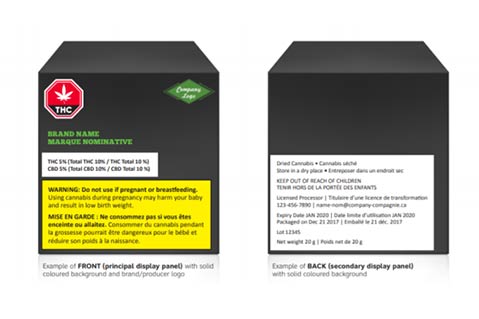News July 05, 2018
Branding, Packaging Restrictions On Canadian Cannabis Matter To Promo Industry
Promotional product professionals should know the rules if they plan to sell to the emerging legal marijuana market.
In a Nutshell
*Cannabis marketers are prohibited from creating branding or package design that portrays a marijuana product in a manner that makes it seem glamorous and/or exciting, among other restrictions.
*Authorities can impose fines of up to $500,000 per offense.
Marketers, promotional product pros and graphic designers dreaming up trippy logos and packaging artwork to build the brands of legal recreational cannabis businesses in Canada might want to pause on their galaxy sketches and tie-dye creations.
Regulations appear aimed at keeping branding, packaging and labeling plain and regimented – a fact that some critics say will hurt the nascent industry.
Canada's cannabis branding laws could negatively impact producers - Cannabis News Box https://t.co/gdfwNQAijN #cannabis #training
— Cannabis Institute (@mjbiztraining) June 30, 2018
Regardless, it will be wise for companies – and the promotional products firms that sell to them -- to comply with the regulations. After all, law empowers authorities to impose fines of up to $250,000 for a first-time offense. Each additional offense is punishable by a fine of up to $500,000. Rule breakers can even face prison time.
Given the stark repercussions, promo companies eager to work with Canadian marijuana businesses must be knowledgeable about the rules. Foremost among them is that marketers can’t create branding that would appeal to minors. Relatedly, marketers are prohibited from creating branding or package design that portrays a marijuana product in a manner that makes it seem glamorous, recreational, exciting, risky, daring or able to produce vitality. Testimonials are a no-no, as are celebrity endorsements. Want to come up with a clever fictional character to help build a brand? Regulations prevent that, too.

Canadian law prevents recreational cannabis businesses from using fictional characters in their branding and packaging. That means potential cartoon creations, like marijuana enthusiast Towelie from the TV show Southpark, will have to be shelved.
Canada’s rules particular to packaging and labelling are firm, too. For marketers, it’s important to realize that only one brand name can appear in conjunction with a single additional branding element -- be it a word, slogan or logo. Also, brands must appear in a single color in a font size that’s no larger than the health warning required for the packaging. If a logo is included, that logo cannot exceed the size of a standardized marijuana logo, which must, by law, be present. Additionally, packaging must be unadorned: use of fluorescent or metallic colors isn’t allowed, while Canadian law also bans embossing, textures, foil, peel-away labels and glossy coatings. Label backgrounds, by the way, must be monotone and contrast with the standardized cannabis logo. No inserts are allowed, and THC and CBD content must be listed. This article in Canadian Lawyer by attorney Cynthia Rowden of Bereskin & Parr LLP in Toronto has a few more expansive details. Packaging could end up looking something like this:

Proposed packaging with health warning labels. Source: Health Canada
Some Canadians were critical of branding and packaging restrictions they view as heavy-handed.
Tie-dyed labels is a huge concern.
— Community TV (@communitytvmh) July 3, 2018
I mean, it’s not like Canada is in the midst of an opiate crisis or anything... it’s the tie-dyed gestapo killing all the kids.
🤦♂️ https://t.co/9ITUTzsGU7
Recreational cannabis is scheduled to officially become legal on Oct. 17, 2018. While some legislators had desired to ban marijuana businesses from using promotional products, they were outnumbered by colleagues who decided promotion through branded merchandise should be allowed, believing that the general restrictions on branding and advertising are sufficient. Still, as companies and the promo partners who support them go about marketing efforts, it will be essential to do so with Canada’s regulations firmly in mind.
